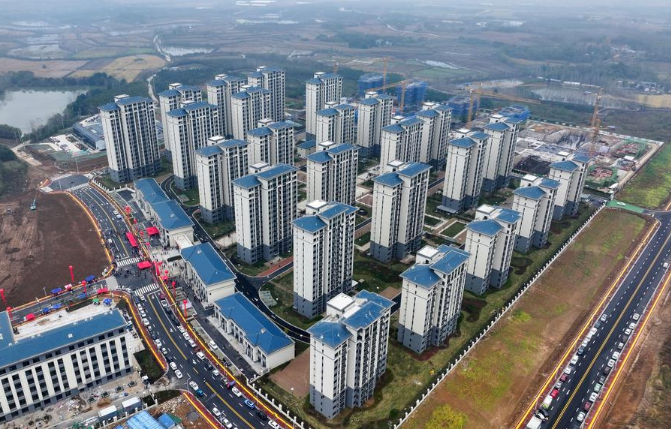
An aerial drone photo taken on Nov 9, 2023 shows a newly-built residential complex in Feixi County of Hefei City, east China's Anhui province. [Photo/Xinhua]
China's steadfast commitment to addressing dynamic risks in crucial sectors is paving the way for steady growth in the coming year, according to economists.
At the Central Economic Work Conference held recently, the Chinese government identified stabilizing securities and real estate prices as among its priorities for the coming year, marking an unprecedentedly clear commitment to supporting both markets. This was highlighted by Yangchoon Kwak, a professor at Rikkyo University's College of Economics.
Kwak said the conference employed the term "moderately accommodative" to describe the monetary policy.
"This signifies a shift toward more proactive fiscal policies and monetary easing, coupled with an enhanced focus on nontraditional countercyclical adjustments. These measures illustrate the Chinese government's deep understanding of dynamic risks in key sectors and its unwavering resolve to tackle these challenges in the year ahead," he said.
Regarding concerns about deflation stemming from the bursting of the real estate bubble, Kwak said the Chinese government has implemented robust intervention measures not typically seen in capitalist nations.
These include expanding shareholder returns for publicly listed companies and mandating real estate developers to complete unfinished housing projects. While the effects of these actions may not be immediately visible, Kwak expects its impact to become apparent by next year.
Simultaneously, the Chinese government is advancing a significant debt restructuring plan to address local government debt issues, securing fiscal resources to support growth through this initiative.
The Chinese economy is projected to grow by around 5 percent this year, contributing nearly 30 percent to global economic growth, according to Han Wenxiu, executive deputy director of the Office of the Central Committee for Financial and Economic Affairs.
Hidetoshi Tashiro, chief economist at Japan's Infinity LLC, observed that China's stock indexes recently have signaled that the economic downturn has been contained.
The new home price index of November shows a rise in Shanghai compared with the corresponding period last year, suggesting that the decline in the city's real estate market has been halted. However, prices continue to fall in some smaller cities.
Tashiro cautioned that while the pace of the real estate market's downturn has slowed, it has not been fully resolved. Consequently, the risk of defaults among smaller financial institutions, including local financing platforms, still remains.
Revitalizing economy
Tashiro underscored the necessity of transitioning from a macroeconomic policy centered on moderate monetary easing to an active policy mix that combines fiscal and monetary measures. This shift is essential for revitalizing the economy by reducing unemployment and stimulating consumption.
"If China continues to develop its private economy domestically and promotes free trade internationally, its economy is expected to sustain growth over the medium to long term," he said.
Tetsuro Homma, representative director and executive vice-president at Panasonic Holdings Corp, said: "The Chinese government is taking a proactive approach to addressing the challenges facing its economy."
On Sept 24, China introduced a series of policies aimed at promoting high-quality economic growth. Panasonic has benefited from initiatives like home appliance trade-in programs.
"Panasonic views China not only as a major manufacturing and consumer market but also as a global hub for innovation and engineering talent. As such, we foreign companies are actively expanding our business operations in China," Homma said.
He highlighted that there are currently over 17,000 Japanese companies operating in China, with substantial and diverse investments across the market.
The Japanese Chamber of Commerce and Industry in China conducts quarterly surveys to assess the economic environment and business conditions. According to Homma, over half of the Japanese companies surveyed said they are either maintaining or increasing their investments in China this year.
Xiong Yi, chief China economist at Deutsche Bank, said in a recent report that the Central Economic Work Conference underscored plans to promote the stabilization and recovery of the real estate market, including to "vigorously implement urban renewal projects" and "step up efforts to renovate urban villages".
On the supply side, the government will deal with existing housing inventories and reasonably control new land supply. The pace at which the government will be able to deliver on these commitments will be crucial for the housing sector, Xiong added.